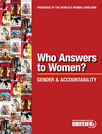Sort by: Author | Title | Publication Year
BOOKS
Profiting from Peace: Managing the Resource Dimensions of Civil WarKaren Ballentine and Heiko Nitzschke, editors Providing both a means and a motive for armed conflict, the continued access of combatants in contemporary civil wars to lucrative natural resources has often served to counter the incentives for peace. Profiting from Peace offers the first comprehensive assessment of the practical strategies and tools that might be used effectively, by both international and state actors, to help reduce the More > |  |
Progress of the World’s Women 2002: Volume 2, Gender Equality and the Millennium Development GoalsUnited Nations Development Fund for Women Tackling the challenges of tracking and determining progress for women relative to the commitments made in the Millennium Development Goals of 2000, this report outlines goals, targets, and indicators using comparative data; charts female literacy, enrollment in education, wage employment, seats in government, and infection with HIV/AIDS; and highlights innovations in measuring and monitoring More > |  |
Progress of the World’s Women 2008/2009: Who Answers to Women? Gender and AccountabilityUNIFEM Progress of the World’s Women 2008/2009 presents new data providing clear evidence that women's empowerment and gender equality are key drivers for reducing poverty, building food security, reducing maternal mortality, safeguarding the environment, and enhancing the effectiveness of aid.
More > |  |
Prohibiting Chemical and Biological Weapons: Multilateral Regimes and Their EvolutionAlexander Kelle Whether in the arsenals of states or of terrorist groups, chemical and biological weapons (CBW) are increasingly seen as one of the major threats to global security. Alexander Kelle provides a comprehensive assessment of the multilateral prohibition regimes that have been established to confront the risks posed by CBW in the context of rapid scientific and technological advances. More > |  |
Project Planning and Analysis for DevelopmentDavid Potts In this comprehensive, practical guide to project planning and appraisal in developing countries, David Potts focuses on economic and financial analysis, but also gives serious weight to such key factors as sustainability and social impact.
Part 1 of the book considers a range of approaches to project identification and design and introduces basic techniques for determining costs and benefits. More > |  |
Prologue to Revolution: Cuba, 1898-1958Jorge Ibarra, translated by Marjorie Moore This landmark study traces economic development, social dynamics, and political processes in Cuba from the end of Spanish colonial rule to the triumph of the 1959 revolution.
Ibarra explores the complex and compelling relationship between North American capital investment and the formation—and deformation—of Cuba's national institutions. Focusing especially on class structures, More > | |
Promises Not Kept: Poverty and the Betrayal of Third World Development, 7th editionJohn Isbister The seventh edition of this perennial favorite includes discussions of major initiatives such as the Millennium Development Goals, changes in international politics and approaches to global terrorism following the US-led military operations in Afghanistan and Iraq, and updated throughout.
More > |  |
Promoting Authoritarianism AbroadRachel Vanderhill Recent years have seen efforts by several states to promote authoritarianism abroad, garnering the attention of foreign policy analysts—and raising a number of questions. What determines the success or failure of these efforts? How does the relationship between international and domestic politics play out? Do states comply with external pressures for ideological reasons, or primarily to More > |  |
Promoting Corporate Citizenship: Opportunities for Business and Civil Society EngagementLaurie Regelbrugge, editor |  |
Promoting Democracy in Postcommunist Ukraine: The Contradictory Outcomes of US Aid to Women’s NGOsKateryna Pishchikova Considerable material and human resources are devoted to building democratic institutions around the world. Why, then, do assistance programs fail to meet their proclaimed goals? And why aren't these programs changed or abandoned when they fail? Using US assistance to women's NGOs in postcommunist Ukraine as a case study, Kateryna Pishchikova shows why democracy promotion programs have a More > |  |



